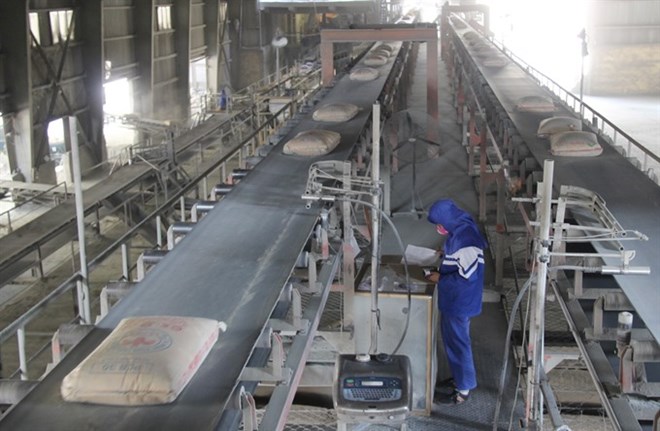
The development strategy of the cement industry by 2030 towards 2050 would ensure a balance between the supply and demand for cement.
A cement production line at La Hien Cement VVMI JSC in the northern province of Thai Nguyen (Source: VNA).
This is because the cement industry will have more supply with more cement factories being operational this year.
The strategy would be built based on the cement industry’s development over the past years, according to directions for the development of the cement industry by Deputy Prime Minister Trinh Dinh Dung.
The Vietnam Cement Association reported Vietnam has 83 cement production lines with a total capacity of 98.56 million tonnes. This capacity will continue to increase because the country is expected to have some cement production lines coming into operation this year with a total capacity of 10.1 million tonnes.
With those projects, the design capacity of Vietnam’s cement industry will be some 108.66 million tonnes.
The association said the actual production capacity of the cement industry can reach 120 million to 130 million tonnes per year. Meanwhile, in the plan, the total consumption of cement is expected to be 93 million tonnes by 2020. Therefore, the industry will have excessive supply of some 25 million to 30 million tonnes.
According to building material experts, there is a contradiction that while some new factories are set up or some existing ones are expanding production, some cement companies could not sell their products.
To deal with this situation, the association and the cement manufacturers have proposed that the Government and the Ministry of Construction should delay the investment in building cement factories during the period between 2019 and 2025.
The cement production lines coming into operation this year include production line 3 and 4 in the second phase at the Vissai Group’s Song Lam Cement Company, with a total capacity of 3.8 million tonnes per year, Ha Tien Kaitian Cement of Thai Group with a capacity of 4.5 million tonnes and Tan Thang Cement Company in Nghe An province with a capacity of 1.8 million tonnes per year.
Source: VNA
In Lac Thuy district, communes have been succeeded in promoting their One Commune-One Product (OCOP) products while others are still struggling to position their typical farming products in market. Some communes in the district still fail to have their products met OCOP programme’s requirements, while others have seen their certifications expired.
The inspectorate agency of Hoa Binh province has issued Official Dispatch No. 1090/TTr-PCTN to provincial departments, agencies, localities, business associations, enterprises, and investors regarding measures to improve informal component indexes of the Provincial Competitiveness Index (PCI).
Hoa Binh is taking concrete steps to improve its investment environment, with a strong focus on supporting businesses, settling obstacles for strategic investors, and creating opportunities for robust development in the coming years.
Under the blazing early summer sun, the construction site of Nhuan Trach Industrial Park (IP) in Luong Son district is abuzz with activities from dawn to dusk, a testament to the determination of the investor to meet their construction targets on schedule.



